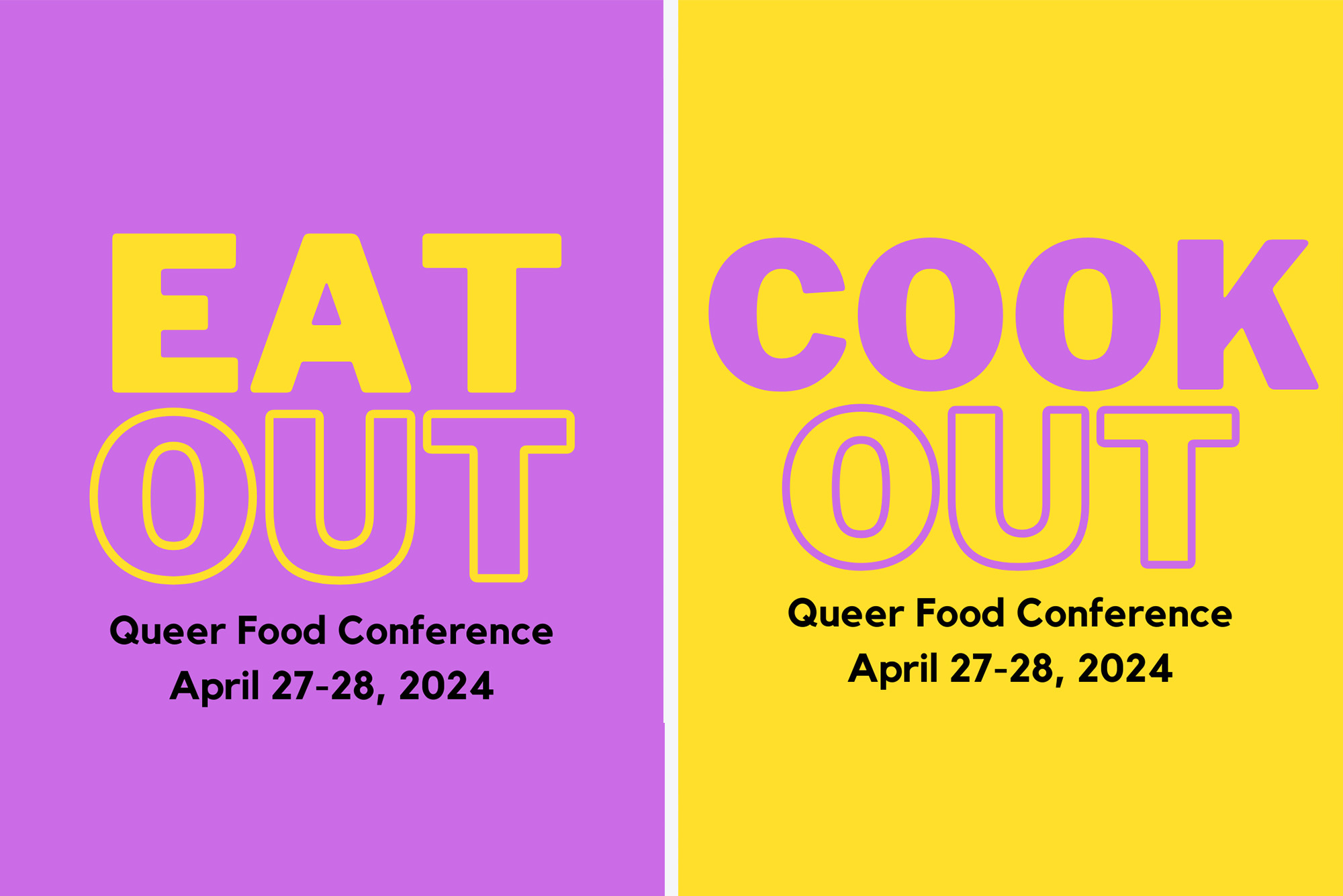BU Hosts First-of-Its-Kind Queer Food Conference
What is queer food? And who’s making it? Scholars, chefs, food journalists to chew over these central questions at BU Gastronomy Program event this weekend

Using input from guests who will present over the weekend, conference organizers Alex Ketchum and Megan Elias put together a cookbook filled with recipes that defy expectations in some way or another. Image courtesy of Alex Ketchum
BU Hosts First-of-Its-Kind Queer Food Conference
What is queer food? And who’s making it? Scholars, chefs, food journalists to chew over these central questions at BU Gastronomy Program event this weekend
Megan Elias, director of the Gastronomy Program at Boston University’s Metropolitan College, wants you to think about recipes.
“When someone talks about a family recipe, what comes to mind?” she asks. “Usually a dish that’s passed down from your mother or your grandmother—and passed to her by her mother or grandmother.”
Now, think about a professional chef. Who do you see? Is it someone who looks like Gordon Ramsay and rules the kitchen with a similar tyrannical flair?
“We have these very gendered ways of talking about food, and thinking about food, and we might not even realize it,” Elias says.
It’s a framework she and her students explore in her course on food and gender—and one that inspired a seemingly innocuous question several years ago, Elias recalls: “What about people who don’t fit into that gender binary? What does food mean to them?”
Elias remembers wishing aloud at the time that there was a queer food conference they could all attend. She’d never heard of one anywhere in the United States. Perhaps she should be the one to organize it, one of her students countered. “I’ll never forget that,” Elias says now, with a smile.
The idea stuck with her through finals, through a new semester, and through a pandemic—until it became a reality. On April 27 and 28, Boston University will host the Queer Food Conference, a two-day event on the Charles River Campus that brings together scholars, activists, artists, journalists, and other food industry professionals for discussion groups, cooking demonstrations, and workshops. The throughline for the entire weekend is a version of the question Elias and her students chewed over years ago: What is queer food and who’s making it?
To organize the weekend conference, Elias teamed up with Alex Ketchum, an assistant professor at the Institute for Gender, Sexuality, and Feminist Studies at McGill University and author of a book on the history of feminist and lesbian-feminist restaurants, cafes, and coffeehouses in the United States from the 1970s through today.
To their knowledge, BU’s Queer Food Conference is the first of its kind in the country. And if the registration figures are any indication (in-person registration sold out by early January, though there’s a virtual track for the weekend that’s still available here), it fills a widespread need.
Elias hopes the conference helps to break down the binary gender roles that have become so entrenched in food history and culture.
“To put it bluntly, we have this idea that food belongs to women—that’s their domain in the family unit, while the men go to work and make money,” she says. “But when you consider a queer person or family, those strict roles don’t really make sense, and they start to break down. The idea of bringing queerness to food is the idea of opening up many definitions, of making it all more fluid.”
Using input from guests who will present over the weekend, Ketchum and Elias put together a cookbook filled with recipes that defy expectations in some way or another. There’s a savory cheesecake, for example.
“Obviously someone who isn’t queer can certainly make a savory cheesecake, but what the recipe represents is this testing of boundaries, this dissolving of those boundaries,” she says. The cookbook will be available to people who attend the conference.
The weekend is packed with discussions on a range of topics, including the radical potential of queer politics in food media; health, HIV/AIDS, and nourishing well-being; and building queer food communities.
But Elias is most looking forward to everything that will happen between panels—the joyful noise of networking, the cross-pollination of new ideas, the alchemy that only occurs when people who might never have met otherwise finally meet.
“And I hope this inspires other people around the country—around the world—to do this, too,” she says. “I’m looking forward to attending the next queer food conference, wherever and whenever it is.”
Comments & Discussion
Boston University moderates comments to facilitate an informed, substantive, civil conversation. Abusive, profane, self-promotional, misleading, incoherent or off-topic comments will be rejected. Moderators are staffed during regular business hours (EST) and can only accept comments written in English. Statistics or facts must include a citation or a link to the citation.